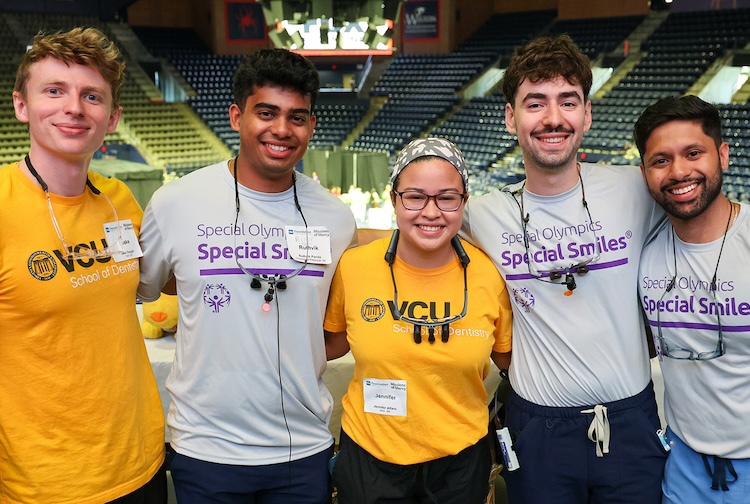
What makes digital dentistry different for patients?
VCU School of Dentistry is teaching innovative methods to take digital impressions of teeth, improving patient comfort and reducing follow up visits.
September 03, 2024 Awab Abdulmajeed, D.D.S., M.S., is the digital dentistry clinic director at Virginia Commonwealth University’s School of Dentistry. (VCU School of Dentistry)
Awab Abdulmajeed, D.D.S., M.S., is the digital dentistry clinic director at Virginia Commonwealth University’s School of Dentistry. (VCU School of Dentistry)
By Vernon Freeman
Sitting in a dental chair isn’t an experience that most people would describe as an enjoyable one. Long treatment times and uncomfortable dental impressions are some of the things that could make a patient’s experience unpleasant.
However, dentistry is quickly modernizing and transitioning to digital technology to more efficiently scan patients’ teeth, gums and mouths. The result has shortened treatment times, enhanced patient comfort, and greater patient education.
The traditional dental workflow and patient experience are changing, according to Awab Abdulmajeed, D.D.S., M.S., assistant professor and digital dentistry clinic director at Virginia Commonwealth University’s School of Dentistry.
“Digital dentistry is revolutionizing the dental profession by integrating advanced technologies that benefit both patients and providers,” Abdulmajeed said. “With its ability to enhance precision, comfort, and efficiency, digital dentistry represents a significant step forward in delivering high-quality and patient-centered dental care.”
Abdulmajeed spoke with VCU Health News about how digital dentistry is benefiting patients and how VCU School of Dentistry’s digital dentistry program is impacting the future of dentistry in Virginia.
What is digital dentistry? How is the experience different for patients?
Digital dentistry involves using advanced technologies to streamline dental procedures and eliminates the need for “goopy” materials that can be uncomfortable and messy for patients to bite down on. Providers use an intraoral camera to take digital scans, called digital impressions. These images are then processed by software to create a 3-dimensional digital model of the patient’s oral structures. These digital impressions are used to design and fabricate crowns, bridges and dentures.
This process improves precision and efficiency in diagnosis and treatment planning and overall patient outcomes in dental care. The biggest benefit for patients is comfort, more efficient dental appointments, and faster turnaround times. This ultimately reduces anxiety, time in the chair, and reduces the number of visits required.
As part of their course, Awab Abdulmajeed, D.D.S., M.S., shows dental students how images taken with an intraoral camera are processed to create a 3-dimensional digital model of the patient’s oral structures. (VCU School of Dentistry)
How can digital dentistry improve the quality of patient care?
Digital dentistry allows providers to see the quality of their work instantly which allows room for the provider to make changes to their work without increasing patient chair time. With the provider being able to provide better restorative care due to scanning, patients have better quality restorations that will last longer.
Digital dentistry also allows for better communication between the provider and the patient. Intraoral scans can be used as a tool to explain issues in the mouth and treatment that needs to be completed. Having the digital scan creates a visual for the patient which allows the patient to better understand what is happening and what needs to be done.
How is digital dentistry at VCU School of Dentistry impacting the future of dentistry in Virginia?
As the only dental school in Virginia, digital dentistry is essential to the VCU School of dentistry's commitment to excellence. Digital dentistry at VCU allows students to receive one-on-one training using state-of-the-art equipment with world-renowned faculty, assistants and laboratory technicians, thus learning the entire digital workflow.
Our students are trained to prepare, scan, design and fabricate restorations using digital technology as well as conventional technology. At VCU, students are exposed to a variety of different scanners, milling machines, 3D printers, and design software encompassing many treatment scenarios including crowns, dentures and dental implant treatment. This is a very extensive learning experience that prepares the VCU dentistry graduate with abilities to perform at the highest level upon entering the workforce.




